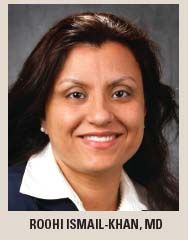BRCA Carriers Benefit From Mutations
For women with triple-negative breast cancer, BRCA mutations can be a boon: These patients have a significantly lower risk of relapse than their counterparts who do not carry BRCA mutations, according to a study out of Houston’s M.D. Anderson Cancer Center. SABCS 2010 will feature an education session on the clinical utility of genetic testing for inherited predisposition to breast cancer.
Results of a new study emphasize the importance of identifying genetic mutations in this patient population.
For women with triple-negative breast cancer, BRCA mutations can be a boon: These patients have a significantly lower risk of relapse than their counterparts who do not carry BRCA mutations, according to a study out of Houston’s M.D. Anderson Cancer Center.
In this study to determine the prognostic significance of a BRCA mutation in women with triple-negative breast cancer, Ana Maria Gonzalez-Angulo, MD, and colleagues extracted DNA from 77 triple-negative breast cancers. They found that 15 patients (19.5%) had tumors with BRCA mutations. The majority of these were BRCA1 mutations (12/15), and all but one were germline mutations.
All the women but one in the study had been treated with anthracycline- and taxane-based adjuvant chemotherapy. A comparison of outcomes at a median of 43 months between the patients with mutations and those without showed that women with BRCA mutations had a five-year recurrence-free survival significantly greater than those without (86.2% vs 51.7%; P = .031), and a better five-year overall survival (73.3% vs 52.8%, P = .225) than those without mutations, although the latter did not reach statistical significance, according to Dr. Gonzalez-Angulo, an associate professor of breast medical oncology at M.D. Anderson (2010 Breast Cancer Symposium abstract 160).
Previous studies have not shown a survival difference between patients with mutations and those without, so her group’s finding was surprising, she added. Dr. Gonzalez-Angulo said she suspects the difference indicates that defects in DNA repair in tumors of patients with BCRA mutations may make their tumors more sensitive to standard adjuvant therapy.
The results highlight the need to identify BRCA mutations in women with triple-negative breast cancer and the importance of physicians discussing genetic testing with these patients, she said.
In the study population, six of the 14 women with germline mutations and the one patient with a somatic BRCA1 mutation were not referred for genetic testing. In addition, nine of the 14 women with germline mutations did not have a first-degree family history of disease.
Overall, the study found that 33 (43%) of the 77 women were referred to genetic counseling and of these, 22 had a family history of breast or ovarian cancer and 21 were 40 years of age or younger, Dr. Gonzalez-Angulo reported.
"These findings, if reproduced, could have important implications for triple-negative breast cancer patients," said Jennifer Obel, MD, a member of the American Society of Clinical Oncology (ASCO) communications committee.
"It may be important to identify women with these mutations because the mutation becomes a rational target for treatment with PARP [Poly (ADP-ribose) polymerase] inhibitors, a class of drugs currently under development," added Dr. Obel, a clinical assistant professor in the department of medicine, section of hematology/oncology at the University of Chicago.
SABCS 2010 will feature an education session on the clinical utility of genetic testing for inherited predisposition to breast cancer (December 8, Ballroom C-2).
Roohi Ismail-Khan, MD
Patients with BRCA1 mutations need close monitoring at younger age

Knowing mutation status is extremely important in an era of personalized medicine, said Dr. Ismail-Khan, an assistant professor in the breast program, women’s oncology department, at the H. Lee Moffitt Cancer Center in Tampa, Fla.
At her institution, she and her colleagues try to offer genetic testing to all breast cancer patients younger than 40 years of age, and to patients with triple-negative disease younger than 50, she said. The fact that results of this study show reduced relapse rates and improved survival is important and reassuring. “They encourage us to continue our clinical practice of monitoring BRCA1 patients closely and at a younger age,” Dr. Ismail-Khan said.
She also emphasized the importance of the finding that BRCA mutations may be more prevalent in young women with breast cancer than previously known, and that family history may not be the only predictor of disease. “It may be that triple-negative breast cancer in a ‘youngish’ patient is a better predictor of BRCA status,” she said.